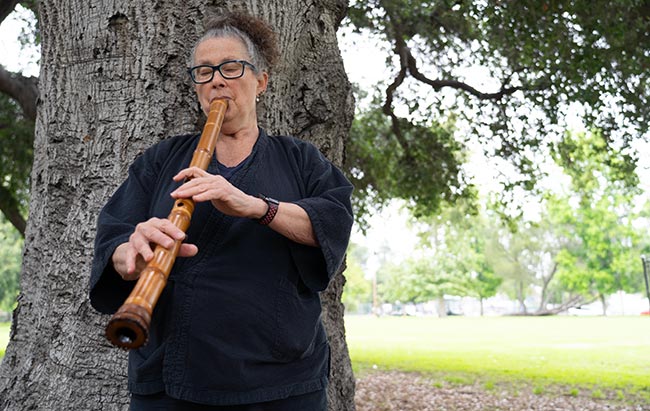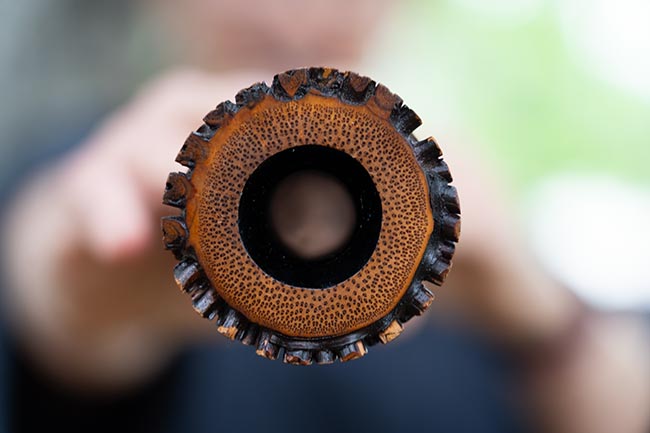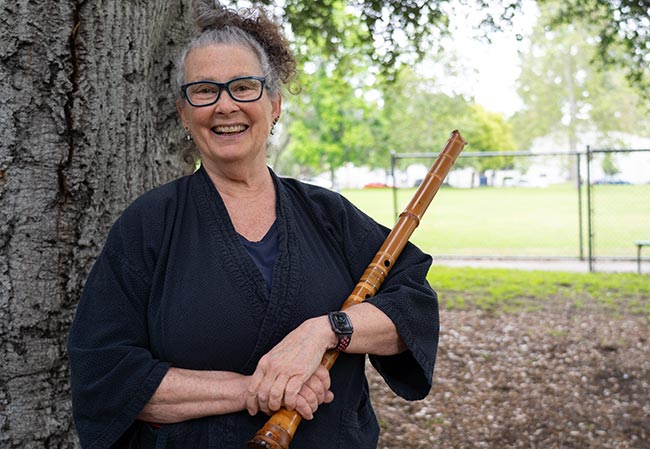Scripps to host camp for ‘the shakuhachi crazies’

Pomona College adjunct music professor Rachel Rudich plays her shakuhachi at Memorial Park last week. Courier photo/Andrew Alonzo
By Andrew Alonzo | aalonzo@claremont-courier.com
Claremont resident and Pomona College adjunct music professor Rachel Rudich is hoping to get locals interested in one of her unique loves, the shakuhachi — pronounced “shaw-coo-haw-chi” — a Japanese bamboo flute.
Starting Thursday, June 6, and running through Monday, June 10, Rudich and affiliates with Shakuhachi Summer Campwill host a five-day music camp at Scripps College, 1030 Columbia Ave., Claremont, intended to serve as an introduction to the instrument. From inexperienced to the expert, all players are welcome.
“It’s nothing but shakuhachi all day long,” said Rudich.
Programming includes the basics of sound production, technique, practice strategies, music theory, shakuhachi history, sunrise “ro-buki,” or tuning sessions, a duet night, a student concert and more. There will also be opportunities for beginners to view more advanced classes and individual lessons to hone their skills, as well as hybrid courses.
“Even if you can’t show up and watch what’s going on in live time, you will have a link later to watch it whenever you want,” said Rudich.

A close-up view of the base of a shakuhachi, a Japanese bamboo flute. Courier photo/Andrew Alonzo
Sessions begin at sunrise each day. Digital camp starts at $250, while the all-inclusive plan, which covers camp tuition, parking, meals and accommodation, is $1,250. Interested camp goers can register at shakucamp.com.
In addition, a 7 p.m. concert featuring shakuhachi masters Riley Lee, Yōdō Kurahashi, Kaoru Kakizakai, David Kansuke Wheeler — the camp’s co-director — and Christopher Yohmei Blasdel will take place at Balch Auditorium, 961 N. Columbia Ave., Claremont, on Saturday, June 8. This year’s guest performer, Yōkō Reikano Kimura, will provide vocal and string accompaniment. Tickets are $30, $50 for a pair, and students and seniors are $20.
Cory Sperry and Wheeler, shakuhachi players and enthusiasts, founded the summer camp a year after the inaugural World Shakuhachi Festival in 1998.
“David and Cory and some other people thought, ‘We need more of this. We need it every year,’” Rudich explained. “They decided to start the camp in Boulder [Colorado] because that’s where they lived. So the Boulder camp happened the very next year in 1999, and it’s been going ever since.”
The Colorado camp, previously named “Shakuhachi Camp of the Rockies,” has been held in Loveland for the last 25 years. With the aid of Rudich and others, the camp recently relocated to Scripps College this year.
It’s unclear where the camp will wind up. It could return to Colorado, stay in Claremont, or move elsewhere. One thing is a given though: wherever the World Shakuhachi Festival is located, the summer camp will follow.
Rudich said the people who attend the camp are often hungry to keep their shakuhachi practice going.
“We are kind of the shakuhachi crazies,” she said. “We have incredible enthusiasm and hunger for knowledge about the instrument.”

Pomona College adjunct music professor Rachel Rudich cradles her shakuhachi, a Japanese bamboo flute. Courier photo/Andrew Alonzo
The shakuhachi was introduced in the eighth century. It originated in China as the “xiao” — another vertical end-blown flute — before gaining popularity in Japan. One uses the mouth and fingers to adjust the pitch by covering the various five finger holes carved along the body.
The origins of shakuhachi are rooted in spirituality. It was once played for mediative purposes for monks throughout Buddhist temples in Japan, Rudich said. Music was usually improvised and, before annotation became a standard, sounds were passed down orally from master to student.
Today, shakuhachi is often heard in American and Asian media.
“If a movie has any sort of Asian theme at all, they’ll just go to the shakuhachi,” said Rudich, who has herself played the instrument on the “League of Legends” video game and the Netflix original series, “Cobra Kai.” “It’s been used also as sort of sound effects in movies like ‘Godzilla,’ ‘Jurassic Park’ … [and] ‘Memoirs Of A Geisha.’
“It’s not easy to make a sound at first but with a good teacher, you know most people do,” Rudich said. “You do a lot of changing of pitch with your head angle.”
Rudich hopes camp attendees will gain a new passion, even if just an inkling of interest in shakuhachi.
“I don’t think we’ve had in Claremont this kind of Japanese music event,” she said. “I think it’s going to be a very unique and special opportunity for residents of Claremont.”
On Wednesday, KSPC 88.7FM aired an interview with Rudich and Wheeler about the camp. Go to kspc.org/listen/playlists to listen.
Tickets for the June 8 Global Shakuhachi Masters concert at Balch Auditorium will be linked at shakucamp.com soon.







0 Comments